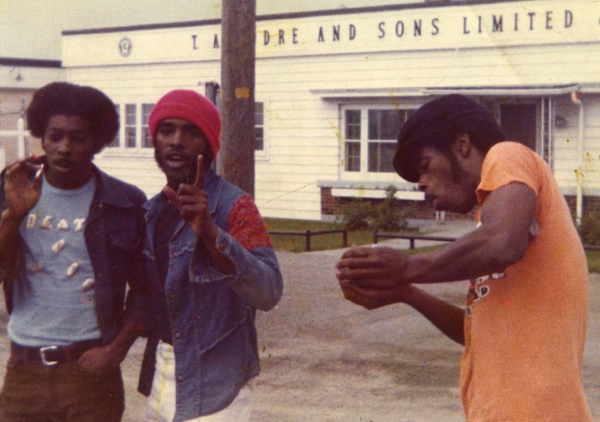Movie review by Greg Carlson
Like fellow Detroiter Sixto Rodriguez, Bobby, Dannis, and David Hackney’s trio Death recorded stunning music embraced and appreciated by its largest audience decades following the original production. A little Motor City magic connects “Searching for Sugar Man” to “A Band Called Death,” another compelling movie version of an almost too-weird-to-be-true tale of unrecognized brilliance and second chances. Made by first-time feature documentarians Jeff Howlett and Mark Christopher Covino, “A Band Called Death” is a great underdog story backed by giddy bursts of rock and roll firepower. It’s also a moving portrait of looking back, moving forward, and family love.
Hard-liners will say it’s a stretch to claim that Death was, as the New York Times headline of Mike Rubin’s profile claimed, “punk before punk was punk,” but only the worst kind of snobs would dismiss the strange beauty and punchy immediacy of garage tracks like “Politicians in My Eyes,” “Freakin Out,” and “Keep on Knocking.” Rubin appears in the film, and his terrific 2009 feature article established the blueprint used by the filmmakers: a tapestry of blood brothers, crate-diggers, and resurrections, the latter partially embodied by Bobby’s children in Rough Francis, a group formed in tribute to Death.
When the movie gets to the details of the 1975 United Sound Systems studio recording session and the subsequent major label flirtation, Howlett and Covino really find their stride, collecting interviews from Groovesville director of publishing Brian Spears – who recognized immediately that Death was something special – and producer/mogul/Groovesville CEO Don Davis, who initially thought his colleague had lost his mind. Following multiple rejections by label after label, Death catches the ear of Clive Davis, who offers a deal contingent on a name change.
Then, in a pure expression of the “corporate rock sucks” mentality championed by punk heroes large and small, David more or less tells Davis to go to hell and the brothers walk away, managing to take the master recordings of their work with them. Pressing 500 45s independently on their own Tryangle imprint, Death further embodies the fierce DIY credo of self-sufficiency, but neither the single nor its B-side get enough airplay to make a difference. The tapes would collect dust in an attic for years, until the inclusion of Death tracks on rarities compilations and interest from record collectors like Robert Manis, Ben Blackwell, and Dead Kennedys frontman Jello Biafra eventually closed a circuit through Bobby’s son Julian.
The movie constantly reminds us that David Hackney was the soul of the group. Some delightful prank phone calls hint at David’s frequency on an unexpected wavelength, and the movie makes clear that the young musician took inspiration from sources like the Who and Alice Cooper. In part because David died of lung cancer in 2000, the visionary bandleader’s absence weighs mightily on the emotional scales of the movie. David, whose conceptual acumen guided the entirety of the Death endeavor, assumes a kind of mythical prominence as an ahead-of-his-time prophet. Howlett and Covino surely play up this status, but both Bobby and Dannis take seriously the spirit of their brother forecasting that eventually, the rest of the world would catch up to Death.
